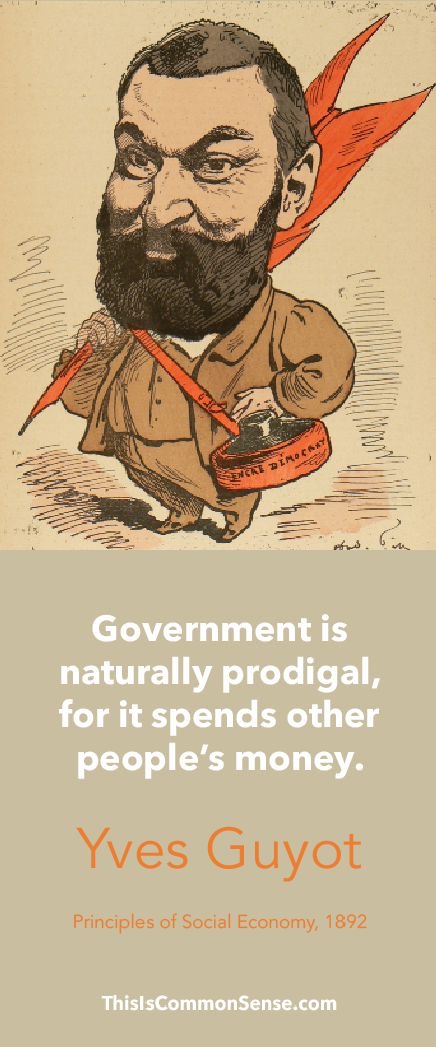Government is naturally prodigal, for it spends other people’s money.
Yves Guyot, Principles of Social Economy (1892).
Yves Guyot


Government is naturally prodigal, for it spends other people’s money.
Yves Guyot, Principles of Social Economy (1892).

Being a clever person is hard work. Many of the truly clever things about everyday life have already been said. New and innovative cleverness? A rare thing indeed.
But if you are in the business of being clever, that puts you in a pickle, if “being relevant” and “worth our attention” is part of your cachet.
Take Alain de Botton, a very clever man who has written at least one brilliant book . . . and several not-so-brilliant ones. He has tackled Proust, Epicureanism, and is now deeply into religion.
Well, maybe not so deeply.
He wants politicians to follow the lead of religious leaders, who, he asserts, are masters of rebranding. (I had thought that was for marketing specialists.)
Recognizing that the word “tax” is an odious one — few people really like paying their taxes — de Botton says that politicians should follow what “religions do” and “rebrand ‘tax’ as ‘charity.’”
Charity, he notes, is a “much more appealing word.”
Well, yeah. That’s because charity is a word for love. It is all about deep concern, sympathy, etc., and “acts of charity” are expressions of love and concern.
And the only way that acts of charity can be determined to be expressions of concern is that they are voluntary. Taxes, on the other hand, are not voluntary. They are taken by force (try not paying them — force will find you).
Forcing people to “be charitable” will automatically scuttle that very purpose.
Trying to rescue politics from the stench of compulsion should not be done with rebranding, but by limiting government.
The less government, the less force.
And more scope for charity.
This is Common Sense. I’m Paul Jacob.
Also, please consider showing your appreciation by dropping something in our tip jar (this link will take you to the Citizens in Charge donation page… and your contribution will go to the support of the Common Sense website). Maintaining this site takes time and money. Your help in spreading the message of common sense and liberty is very much appreciated!

“Government is naturally prodigal, for it spends other people’s money.”
A few weeks ago, when the Ferguson, Missouri, protests were well underway, a few crucial facts emerged from the tumult.
A graph showed that Ferguson led the state — by a wide margin — in arrests per capita.
While it’s true that Ferguson could be that much more violent and criminal than every other city in the state, somehow that possibility doesn’t seem very plausible.
When we learned that “86 percent of stops, 92 percent of searches and 93 percent of arrests were of black people — despite the fact that police officers were far less likely to find contraband on black drivers (22 percent versus 34 percent of whites)” … well, the whole thing stank of something other than a mere crime problem.
And, of course, a “war on drugs” problem.
Another fact, from the same source: “Ferguson receives nearly one-quarter of its revenue from court fees; for some surrounding towns it approaches 50 percent.”
No way to run a government. Journalists and activists call such regimes “for-profit policing,” and cite the rise in civil forfeiture practices as encouraging and solidifying the method.
But “for-profit” is a bit of a misnomer.
It’s more like rapine (an old word you might most often see paired with “pillage”) than “for-profit.” It’s a looting system, while “for-profit” suggests selling a service freely on the market and earning rewards for filling consumer needs. Ferguson basically engages in shaking down a population of people, repeatedly profiling and harassing them, extracting as much of their wealth as can be had — Frédéric Bastiat’s “legal plunder” comes to mind — and leaves them to … protest, later.
This is Common Sense. I’m Paul Jacob.
Certain sheriffs in Colorado and other states have something in common. None of them will ever have to say “I was just following orders” as an excuse for failing to respect the right of an individual to bear arms.
They’re simply not following those orders.
In Colorado, Sheriff John Cooke of Weld County says that in addition to being unconstitutional, the state’s new gun-control laws are so vague as to be unenforceable. Before July 1, it was legal to sell or transfer a 30-round magazine. After that date, not. In explaining his policy, Cooke flourishes two such identical-looking magazines, one purchased before July 1, one after. Then shuffles them. “How is a deputy or officer supposed to know which is which?”
John Cooke is one of 55 elected sheriffs (out of 62 total) across Colorado who joined a federal lawsuit challenging the constitutionality of the new law. Also, two Colorado lawmakers have been recalled by voters for supporting it; and a third resigned rather than face a recall.
“In my oath it says I’ll uphold the U.S. Constitution and the Constitution of the State of Colorado,” says Sheriff Cooke. “It doesn’t say I have to uphold every law passed by the Legislature.”
We all know that the vagueness, ludicrousness, or unconstitutionality of a law doesn’t necessarily stop officials from coming down on citizens like a ton of bricks. So the sheriffs’ refusal to obey is commendable. And an example to follow.
This is Common Sense. I’m Paul Jacob.
The business of business is to profit by helping others. The business of government is to make sure that businesses don’t profit by cheating others.
Unfortunately, sometimes it’s the governments that cheat.
Take the airline industry. Though substantially deregulated by the early 1980s, government has not treated it in an exactly laissez faire manner since. First there are the taxes, quite heavy. And recently the Department of Transportation decided that it must regulate the way in which airlines may advertise their prices . . . and the taxes. That is, the DOT insists that the “total price” — by which it means the price-plus-tax — must be shown prominently, with the tax portion “presented in significantly smaller type than the listing of the total price.”
Talk about regulatory micromanagement!
Now, this rule isn’t something Congress cooked up. It’s the result of a bureaucracy gone wild.
And the rule has one obvious effect: It shields government from consumer criticism, showing bureaucrats at their most self-serving. About one fifth of every airline ticket goes to the government, and folks in government don’t want you to know that.
This being the case, you might think — as George Will does — that the First Amendment would apply, especially since the First Amendment is now routinely held as protecting political speech more strictly than commercial speech. But, so far, courts have ruled for the taxing and regulating bureaucrats, not the competitive airlines. Or consumers.
Frequent fliers (I’m one) should hope the Supreme Court justices take up the case, which shows why economic and political freedom go best together.
This is Common Sense. I’m Paul Jacob.